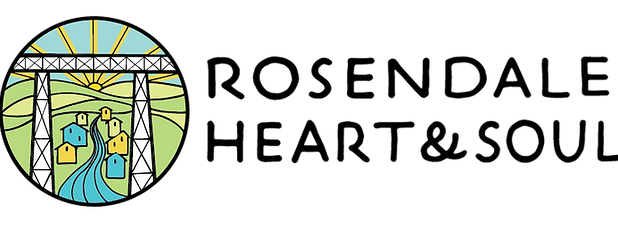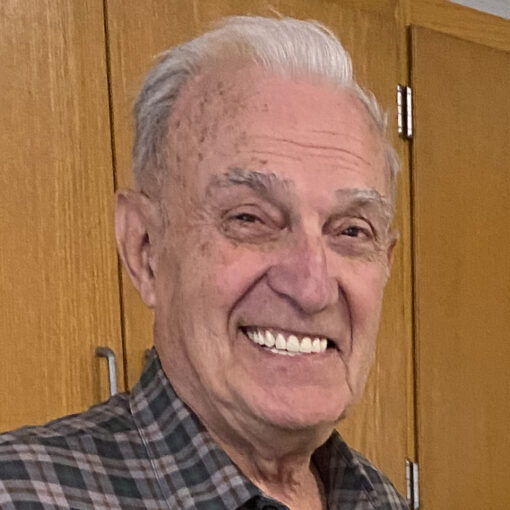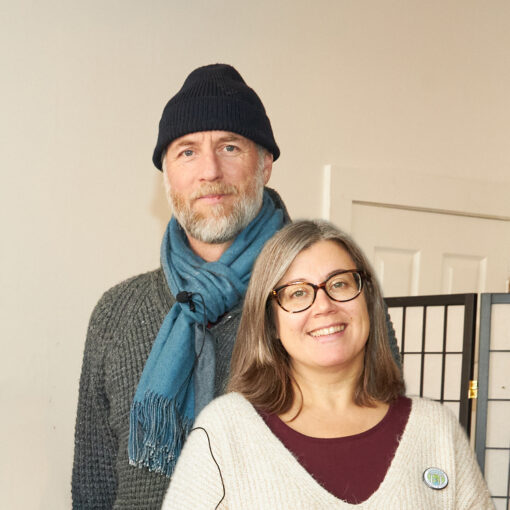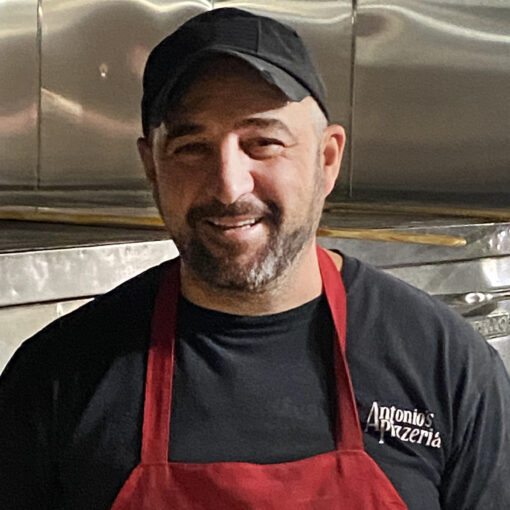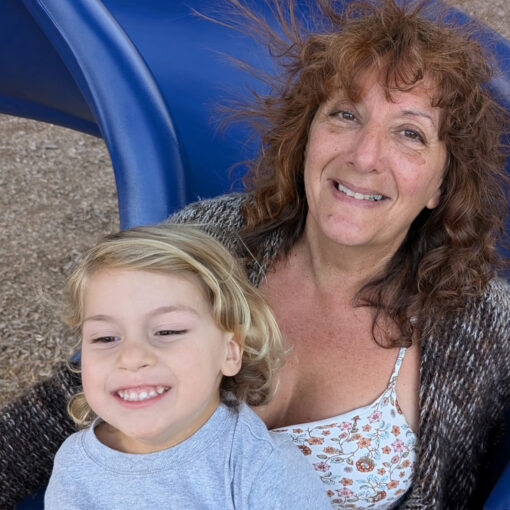Leah and Peter by Ruthie, December 4, 2023
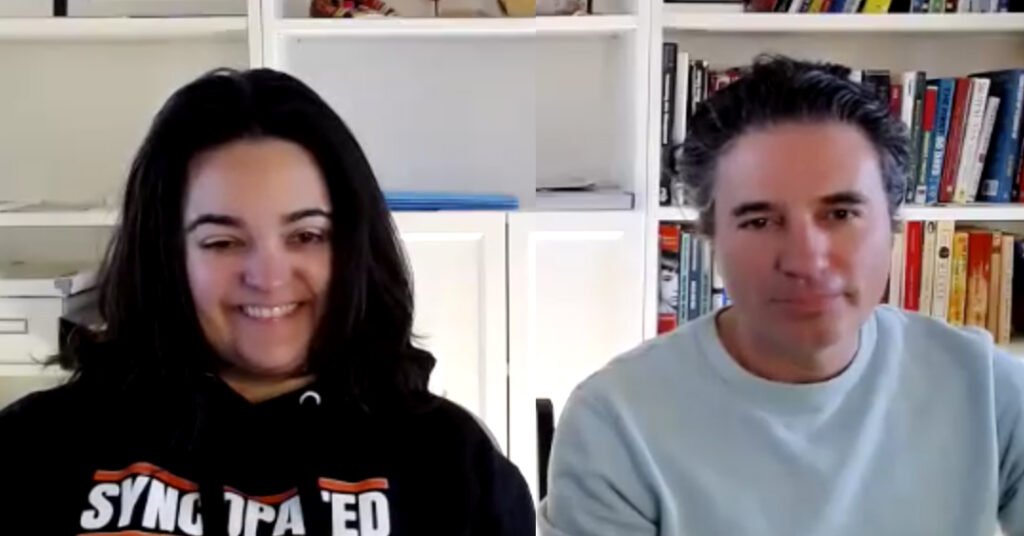
Ruthie: How did you two come about living in Rosendale?
Peter: In 2000, in the 2000s a buddy of mine was living up in the area, he was actually living in Highland, and then he would come to Rosendale. He and his wife would tell me about Rosendale, about like fun, things to do, and Rosendale and their business.
Leah: She had a business.
Peter: They bought a building, that “Planet Pet”, which is right across the street from where we live.
Leah: It’s no longer Planet Pet.
Peter: It’s no longer pink, either. It’s kind of pink or purple, everybody would know it’s the pink or purple house. So I’d come up and and they owned a building, and then I would come up and visit them, and then we’d come here, and in 2010 he told me about a building that was for sale and that building was 426 [Main], where the tattoo shop is now, there was no tattoo shop there. But it had a beautiful storefront and amazing wood floors wide pine floors, and it had 3 apartments. It was up for sale, and he asked me if I wanted to go in it and on it with him. It made sense for me at the time. So we bought the building together in 2020. We still own it, it had a four car dilapidated garage in the back of the property. So so yeah. And then I lived up here for a year with my son
Leah: and I would come up on the weekends. The storefront at that time became like a studio called open space, so there was like Yoga and Karate. I’m a former flamenco dancer, so I would teach Flamenco on the weekends when I would come up from the city area.
Peter: So I lived out there for a year. But it wasn’t the right time for me. So I went back down, back to the city environs, and then in 2019 we said, why don’t we take over one of the apartments? To have as like a getaway?
Leah: As a release valve from the city.
Peter: or Air B&B or something, and we started that in August of 2019.
Leah: So we took out one of the one bedroom apartments of the building.
Peter: and then started fixing it up, and then January, February 2020 came! March! and we were up here on the weekends.
Leah: with our daughter, who at the time was 4. And our dog, in a one bedroom apartment right.
Peter: And so we were coming up on the weekends, and then we started coming up. and then well,
Leah: we just started staying more and more, and it started flipping. We were spending more time up here than down there in our house, and then finally, we decided to put our house on the market and we committed to living here. So we put our daughter in school here.
Leah: There’s lots in that time frame. I mean in August of 2019 it was like we were coming on the weekends and she was four at that time, and then pandemic hit, spending more and more time up here , because everybody was working from home right? And then also a big part of the reason we decided to stay here was, we had been trying to figure out how to get… We lived in New Jersey just across the river from the city, but we would be going into the city all the time, but we had been trying to figure out a way to extract ourselves from there for a while, but just because both of our work was there. It was challenging to do and then, of course, work from home became a thing. And it was like, okay, but also we created more community here for our daughter than we had down there, right? I mean, in the New York area, you know a lot of people, but people live in Brooklyn and Queens, and we were in New Jersey. But we became very good friends with our neighbors next door. Maya, David [Maia Martinez & David Salvatierra], and they have a daughter who’s our daughter’s age, and they live above the cafe, the Rosendale Cafe, and so they became like our pod during the you know. And again there’s also there’s an affinity there, not only because of our children who are the same age, our daughters, but also culturally. I mean, I’m Colombian American. Both Peter and I speak Spanish. We’re in the performing arts. So Peter is a performer. He’s a percussionist. I’m a former performer. and we have our own business, I mean because of the pandemic, the agency I used to work for shut down, so we created our own busines, that is a producing company and an agency that we do touring shows. And Maya and David, they teach tango and salsa. And he builds cajons, which is his instrument.
Peter: Yeah, it was just very serendipitous and you couldn’t have planned it.
Ruthie: Is it fair to say that besides having a spot to be up here, the community that you found yourself surrounded with was a big factor in your staying in Rosendale?
Peter: Yes.
Leah: 100%
Peter: We didn’t see ourselves living on some land with acreage, we didn’t want that. We want to be in a place where we can walk, where where you know. I mean, it just keeps getting better with Joppenbergh here, and the trails and the rail trail. It’s this perfect little spot that actually has a lot that other places don’t have, either because they’re too remote or they’re just that that that’s not as charming.
Leah: And then, when you know, in the middle of the pandemic and stuff. It was like, Okay, our daughter, we need to put her in kindergarten like, what are we gonna do? Cause you know, we had our pod like in the summer of 2020. But then it was like, Oh, my! It ran its course. It was like, what are we gonna do like we have to work. We now have our own business like, how is this gonna work? And we called around to the different schools and we knew High Meadow because when Peter was here with his son, he went there for a year, but they had a long waiting list. And it was like, Okay, she needs to go into some sort of school environment.
And we reached out to the Waldorf School in New Paltz and that time. It was like November 2020. I was like, as long as I can get her into a school like in September ’21. I’ll be happy. And they were like, we have availability. In January. It was like done! But it turned out, you know, it’s like we weren’t planning on that, but it turned out that the community there at the school as well has been so amazing, so amazing, and so to have that combination of our local Rosendale community now that we’ve been here, you know, full time since 2020. It’s like. you know, Maya, David, their family. There’s another family also, with young kids who’s behind us in the Grandidiers, the French family who’s in the White House off of the parking lot. And they have 2 kids, you know. So between the 3 households that we’re able to provide safe environments for our kids. And then also, like the school community at the Waldorf in New Paltz, where there are families who are here in Rosendale, there are families in Accord, there’s another family on Main Street that goes to the school, Kerhonsen. of course, New Paltz. And then some folks from Kingston. So yeah, that’s been amazing.
Ruthie: That’s beautiful, especially for your daughter. And how does how has it been : with your work now that you’re here? Full time doing the production and everything? Is that is that going?
Leah: Well, as long as I have Internet and phone, it’s possible. Because it’s what we do is we? It’s not about doing local productions. We represent a roster of like 8 projects or artists.
At the core of what we do, it’s like 2 fold. I sell our projects, our artists, to performing arts centers across the country and organize their tours. And then 2 of the productions we produce.
So when that project is ready to go on tour, one of us has to go, either wherever the project’s rehearsing. Is it the city, wherever it might be. so, so much of it is, is planning and selling. It is a lot of it is some travel, so the proximity, you know, to the city, to an airport is important, because it’s it’s traveling to different conferences. Sales conferences, traveling to rehearsals, traveling to meet a tour wherever it might be. So that’s part of what we
Peter: yeah. And it’s for for me. I had to all change my pace. I was doing a lot of performing and teaching in the city which I had to make a conscious decision to sort of let go of most of it. I perform one of the tours that we produce. And I go down to the city once a week. I run a Flamenco show down in the city that’s once a week. So that’s my likes. I get my city fix. But we find ourselves going down city.
Leah: I mean, you go down more than I go down more than you do. Yeah,
Peter: less and less. We usually drive it down. Go to the airport.
Ruthie: do you still have a home down there, or is that over?
Peter: we sold it in AUgust of ’21
Ruthie: Cool!
Ruthie: And so when you guys are here in Rosendale, just not working, besides the mountain and everything, what kind of things do you do with the community, or just for fun?
Leah: we like to go, in the fall like just seasonally, like the orchards, you know. Westland orchard. Stone Ridge orchard. The rail trail.
Peter: Yeah, I’m a cyclist I’m up on Joppenburgh every day, with my dog, with our dog.
We were happy that Darling’s opened up. That was that was a good one. That’s a nice place to hang. We go, I mean, it’s like, you know, we go to the Santa Fe like probably once a month. And the Cheese shop is just, you know, it’s great to be able to go get a cup of coffee, or just get out. Clear your head. you know. Meet with somebody at the Cheese shop, and just have a a cool lunch and carry on with your day.
Peter: We’d like to see more businesses on Main Street. You know one of the questions here, and we’re kind of like mixing things up, I know. But since we’re just in the sort of conversational flow I just. I wish that the town would support businesses more and have some type of plan because we’ve seen businesses attempted and then shot down.
Leah: Yeah.
Peter: And a lot of this, I understand the parking situation. On Madeline, that little coffee shop that was gonna happen, at the old Market Market. Yeah, like that. They were gonna do something, and then it was parking. Well, how did Market Markets, or how did how did they like? I don’t understand. And then there was this like juice spot that was like a grab and go spot.
Ruthie: It looked like it was about to open.
Leah: It was like they had the blenders in the window. I don’t know if it was an internal thing of the person who was gonna have the business.
Peter: and it’s a Catch-22, because the tattoo shop, we rent it out. They’re great people, they’re hardest. They’re like. And they’re solid people. They are like, been there for like 11 or 12 years.
Ruthie: you guys own that building, and that is one of the only accessible buildings on Main Street, too, which is great, intentional or not. But it is.
Leah: I think it was already accessible. Yeah.
Leah It was when we bought it. Because we didn’t do any the like, the ramp or the bathroom thing right?
Peter: Yeah. So so the the thing with this town is like food is the on is one of the few things that works. you know. Soy, Santa Fe, the cheese shop, and then you go down, and then you know the Creek clocks diner, or whatever is that?
Leah: The Bistro. Antonio’s , but like on Main Street, it’s great that we have bookstore but you know, if the cafe closing that was like mmm, and nobody really knows what’s going on, and they don’t really know what they’re doing and it but it’s not. It’s just not a good look. And and I feel like like with these businesses. I think food is the only thing that’s gonna like that … there were the people at the candle shop, but they were retired, and they they they opened at a really bad time. They opened right when the pandemic started.
Peter: so it’s sort of a bless you catch 22 where you know you? Oh, no parking, you know. Oh, well, do you have parking? Well, no, it is what it is. But how do you? And we don’t want this to become a mall. But how do you get a little bit…
Leah: more intentional about it, I think.
Peter: And Rosendale has this reputation for being gritty, and that’s fine. But
Leah: times also change.
Peter: Times change. Like, let’s update things?
Leah: Well, I mean, the thing is, too, you know, speaking of, like the grittiness. And and it’s like, again, we have an 8 year old daughter, and there are more and more kids on Main Street, you know and just keeping it safe for our kids. You know, the people speeding down Main Street. And it’s a whole thing. And as far as like, you know, people say, Okay, how do we go to the town like, can we fix the speed limit? But it’s like, No, it’s a highway department thing. And then, like, No, it’s the State Highway Department, and then, of course, it’s a highway. So there’s certain things about that. But just making it, you know, if we want more people to be walking down Main Street.
Peter: Fix the sidewalks,
Leah: fix the sidewalks, you know. If we want more businesses. Okay, we don’t want the cars come going down at like 50 miles an hour, and the trucks, Is is there an appropriate place that we could put a light, you know a street light. Down at this end? You know we have one at the front end of Main Street by Stewart’s. But can we put one on the far end of Main Street?
Peter: You know what they do have in High Falls is, and it’s only on the weekends. If you notice, if you’re driving into high falls from Rosendale, they have that the blinking sign, 30 miles an hour. Now we have a stop sign, but a a nice stop sign, and a speed limit. But if it was, even if it was on the just, on the weekends just below. We are community we care about this. We’re just reminding you, slow down.
Ruthie: And when you, when you have visitors from out of town. What is like the quintessential Rosendale thing? If you wanted to get them acquainted with the town.
Leah: we take them up to the trestle, we take them up the mountain. The Cheese Shop .
Leah: But it is like more like walking. Up the mountain over to the trestle. I mean the signs that were added recently. I think that Jen Metzger, but it’s been like 5 years. Probably she spearheaded it, but the new signs that it’s like, Oh, you can walk to the trestle this way or this is Main Street like that. Just a small thing like that, I think, was so helpful. That was a really nice addition that we noticed once. We, you know. and what we’re calling “Rosendale 2.0”
for us:
Ruthie: what would your really miss about this town if it was gone
Peter : You know this, this, the town is situated in such a unique spot. The more I get familiar with the area, the more I realize what like a little gem this, is this little town. and how, how, where it’s situated, you know, and how it’s sort of tied to New Paltz and tied to Kingston, but is its own entity. I don’t know where we would go. Wouldn’t want to go farther north.
Leah: and that’s the thing is like, this is just such such a perfect balance of. I mean, it’s not urban. It’s not Kingston, right like, I think, Kingston, that’s not a vibe. What I would want to be living in. But I don’t want to live either in the middle of nowhere, Kerhonksen, on some acreage like that doesn’t do it, either.
Peter: It’s the right balance of your not in nowhere but you can do your own thing
Leah: and it’s not suburban either, like where we live in Rosendale. I understand where other people might live in Rosendale, in more of the neighborhoody areas in Tillson, or the neighborhoody area of, yeah, just of any of the surrounding areas that Rosendale encompasses. I mean, we’re really lucky that we’re on Main Street
Peter: I like the water, too. The Water is like. It’s really soothing. It’s wonderful to have the mountain. We have the little canal behind our house, so there’s like water there and then the creek like, there’s something soothing about that. And it’s funny you can like, really like, clear your head like going walking around you. Really, you really can. You’re not inundated by things. But you’re not out in the middle of nowhere. It’s a great, it’s a great balance.
Ruthie: Sweet spot.
Peter Yeah, yeah, that’s why we. That’s why we built our place here.
Ruthie: And you you intend to stay.
Leah:Yes.
Ruthie Do you anticipate that? If say, if Main Street was just like filled with stores and was like booming, do you think that’s something that you definitely would like? Or is it like, maybe cause. I wonder about this, too, when we want certain things of a place that we’d love to be like tweaked right cause I feel the same way. And then, so I live 2 doors down from where Market Market was, and I was excited for that coffee shop. I was like, this is gonna be great. I have 3 little kids myself. And I was like, we can like, just like bop right there, like so sweet. And then it didn’t happen, and I was like kind of sad. But then I was thinking about it. And I was like, maybe if it was busier around here, maybe maybe it wouldn’t be so. Not sure. And I think it’s like it’s hard to tell. But do you think that we would be able to maintain this sweet spot of ” pretty cool, but not too cool”, “pretty busy but not too busy” , to make sure that we change enough to stay the same. I guess that’s what I’m asking.
Leah: I think that would happen naturally. just because there are so many people who have been in Rosendale for so long. who really don’t want that change. But I feel that despite if there are people who are like “yes, we want it to be like this” The folks who don’t want change are still digging their heels in : so it won’t ever get to be like this. It it might get to be like this right?
Ruthie: They’re like the anchor,
Leah: which is fine. Yeah, they’re like the anchor. But I think, that there’s there just naturally. Is that balance because of the people who have been here for so long, Which is fine, you know I’m not like saying that that’s a bad thing, But I’m just saying that’s what’s not going to allow that change to happen so quickly.
Peter: Yeah, going going back to, I had said before, is like just some kind of intentional planning. Just I mean, there’s a way to do it where it doesn’t get out of control because you don’t get let it get out of control like towns that have, say they might have a chain store, and I don’t want it any kind of chain here. You know Dollar General is enough. But the you know that have, you know they might have a chain store, but you’d never know it like they. They don’t allow the sign to, you know, to be a big gaudy sign, or this huge neon thing. So just along those lines, and again, I don’t want any change. That that’s not the point, not the point.
But the point is that there are. There are storefronts that were turned into apartments like the drug store. There used to be Vaughan’s drugstore that was turned to an apartment. It’s like ew!, you know, like these storefronts that are nothing’s happening. And so why don’t we help? You know? Why? Why? Why is that? There’s some kind of plan, that’s all. Just the plan going: there are 6 storefronts, you know, or however many stores. Let’s say there are 10 storefronts on Resident and 3 or 4 of them. Nothing’s happening. Well, How can the work with the landlords to get a viable business in there. Is there any kind of incentive? Is there any kind? How can the town work? Because then it’s good for then that’s good for the tax base. No. Do we want tons of cars, more cars on Main Street? No, because. It’s gotta work for the community right?
I know that there’s that thing of growth where you know you, Be careful what you want. You just might get it. but it would be nice if there was just some active part, or you know, and as a as a landlord, I don’t get anything. No, nothing like no communication. No.” Hey, what you think about this business? What would you like to see? How would this help your tenant who has a business?”
Ruthie: So you’re saying you guys don’t get any kind of communication like from the town regarding like your direct area.
Peter: Like you said the coffee shop would have been amazing.
Ruthie: Yeah. And are you do you two, Are you ever involved in any of the town board meetings, or anything. Do you spend any time up there?
Peter: III with the whole permitting process for the building, for the building. I was, you know. but because the nature of our business, because we of our kid, it’s difficult for us to make time and sometimes those meetings are like in the middle of the day. It’s like, who can go to these things?
Ruthie: I’m gonna say with that, really I’m interested and I want to go to these things and that way i do have a leg to stand on when I talk them them about what’s going on…
Leah: I think it’s challenging for parents in general to get involved. And so that’s a whole demographic. And that’s why it was like we wanted to make it a point to speak with Heart & Soul because we’ve seen you guys at the farmer’s market. We’ve talked to a couple of the folks involved in Heart and Soul like it seems like it’s an organization that we feel like can have, that we can share our voices with, and who can be advocates also for a parent demographic, because it’s very challenging, you know. If you look at the makeup of the town board, It tends to be older folks. maybe I’m wrong. Maybe somebody just got voted in those younger.
Ruthie: There’s there’s one woman that’s around our age, I think Ashley and I think she and her family have been here for a while, and she does a lot with the Youth Center. She probably has a couple of kids, but she seems like she is like leaning more towards our vibe with like you know, where we are in life, anyway. And I know Jeannie did express to me that she wants there to be younger people on the board, also because she’s been doing that job for quite a while.
Leah: Cause she was the town supervisor in 2010 at least.
Peter: I love this this open conversation. You know that you guys have started. And it’s it’s not about a complaining session, you know, because there’s yeah, it’s like, No, there’s so much has been built way before we ever got here, and one of the, you know, and all so many good things were here when we got here, and it’s not about changing the culture. It’s just, you know. we see even those things that were here. They’re changing like the pickle festival wasn’t here this year. Now the pickle festival’s in New Paltz. things grow, things change. So it’s not just about, you know, newer people coming in and changing. No, everything changes, you know. It’s the nature of things. So
Leah: being intentional, right eyes open instead of just, you know. not wanting anything to happen. Yeah, yeah. Yeah. Cause. Unfortunately, you know, it’s like as even though we’ve had a relationship with Rosendale since 2010 in different ways. You know, Peter, living here for a year, and then obviously owning the building and then coming up for “Rosendale. 2.0” you know, we’re still looked at as newcomers, and there’s very much, you know. And the pandemic obviously augmented that, And there definitely still, maybe not as much. But there still is that with the people who have been here for a long time this Us. Versus them mentality. And we’re definitely on the in the “them” camp, you know. Oh, they came in. Oh, “what is that new building going up on Main Street? You know. What are they doing?” And also, you know, organizations in the area : being like, Oh, this is our community and volunteer and volunteer. And it’s there’s a lot of like this. Like, come and help us come and help us. But we don’t want your kind of help.
Ruthie: Can I be frank with you? Yeah. Because, as someone who is from Sullivan county and like lived here in my twenties and like came back. You must understand, like, what it’s about. Right is that we live in this little area, and many of us are not able to afford homes here, and it’s a little bit envy and a little bit distrust. But then the whole point of Heart and Soul is that like we get to actually talk to the people. It’s not this image of like “city people”, or like “Redneck locals”. It’s like we’re we’re all actually humans well beyond the binaries that we put in place. And you know, like, if we all just get to know each other a little bit, and we see like where the common ground is, where all these common threads are, we could actually weave it together to something where everybody is in, like a real community without all the undercurrent of…
Leah: And I mean what you’re mentioning about like just housing, instability and people getting pushed out. I mean, that is a real thing. And that’s I mean, I hear that, you know, and seeing, you know and seeing what the market is doing. And you know people who have been renting for years and years and years. And then being so, yeah, I understand that.
